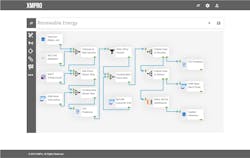Working in business development for a provider of an Industrial Internet of Things (IIoT) development platform is the most interesting job I’ve had since working as a young soldier in the 82nd Airborne Division nearly 30 years ago. In many ways, I see companies jumping into IoT projects the same way I hurled myself out of the US Air Force’s C-130 Hercules aircraft. They stick their “knees in the breeze” and hope for the best.
Over the course of my tenure here it’s obvious this is a new and growing category of improvement programs that most F1000 business are dedicating time and resources to understanding. I’ve turned back the question I’m often asked—"Why should I consider looking at an IIoT development tool or platform?”—onto a number of companies that have made the investment and here’s what they said:
1. IoT is here to stay and the projects have real ROI/payback
The ability to gather new information and insights into assets and business critical processes AND act upon issues in the present tense is proving extremely valuable to the industrial marketplace. The most critical element is not necessarily the insight gathered from2. Complex environments that present unique challenges
IIoT projects can add complexity to the traditional project lifecycle. The constantly changing hardware and software (often device firmware) along with balancing the need to leverage cloud applications, edge computing and integrate both traditional and homegrown operational systems is enough to overwhelm a project team in the early project stages. Combine that with the questions of how to document the system and provide the proper security and it’s easy to see why a foundational tool set is a consideration for so many companies.
3. An agile development platform accelerates project completion
The right platform provides the right balance of structure and flexibility to accelerate the first IIoT project, but it’s the ability to use those building blocks to drive faster adoption of subsequent projects that makes the biggest difference. From predictive maintenance to asset management and track and trace applications, there is no shortage of low-hanging fruit for those exploiting IIoT project opportunities.
4. Put the power of project into the hands of your subject matter experts (SMEs)
The latest generation of IoT development platforms focus on visual and graphic user interfaces that allow companies’ field engineers, plant maintenance teams and service technicians to design and test their processes (See the example of XMPro’s Stream Designer pictured). They remove the burden of specifications translation and supporting the highly iterative nature of IoT process design from the IT team by allowing the SME closest to the project to control the design-test-refine cycle. Doing this prior to deployment is saving as much as 50% of the time typically needed for implementation.
5. Protect your intellectual property (IP)
Due to the complexity of many IIoT environments, the vast majority of initial implementations have been done by third-party firms specializing in creating custom solutions. It’s only natural that these same firms look to similar companies to repeat many of these high-impact projects. By keeping the project in the hands of their SME’s, companies inherently protect and maintain their IP creation. In this way, they protect their unique processes and system designs that set them apart, enhancing their competitive advantage.
Tom Rodgers is the director of business development with XM Pro, where this post originally appeared.

